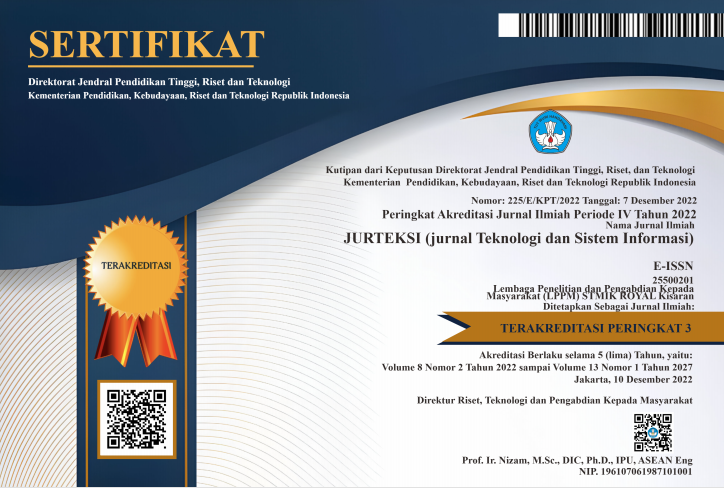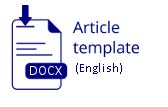SENTIMENT ANALYSIS USING NAIVE BAYES ALGORITHM CASE STUDY ON AMAZON E-COMMERCE PRODUCT REVIEWS
Abstract
Analisis sentimen adalah proses mengidentifikasi dan mengklasifikasikan opini dalam teks menjadi kategori tertentu seperti positif, negatif, atau netral. Penelitian ini bertujuan untuk menganalisis sentimen ulasan produk pada platform e-commerce menggunakan algoritma Naive Bayes. Dataset ulasan produk diambil dari Kaggle, terdiri dari ribuan ulasan dengan label sentimen. Metodologi mencakup tahap preprocessing teks, ekstraksi fitur menggunakan teknik TF-IDF, dan penerapan algoritma Naive Bayes untuk klasifikasi sentimen. Hasil penelitian menunjukkan bahwa algoritma Naive Bayes memberikan akurasi sebesar 94%, membuktikan kemampuannya dalam analisis sentimen dengan dataset teks pendek
References
Bird, S., Klein, E., & Loper, E. (2009). Natural Language Processing with Python. O'Reilly Media.
Pang, B., & Lee, L. (2008). Opinion Mining and Sentiment Analysis. Foundations and Trends in Information Retrieval.
UCI Machine Learning Repository. (2024). Sentiment Analysis Dataset. Retrieved from https://archive.ics.uci.edu/.
Jurafsky, D., & Martin, J. H. (2023). Speech and Language Processing. Pearson.
Manning, C. D., Raghavan, P., & Schütze, H. (2008). Introduction to Information Retrieval. Cambridge University Press.
Porter, M. F. (1980). An algorithm for suffix stripping. Program, 14(3), 130-137.
Aggarwal, C. C., & Zhai, C. (2012). Mining Text Data. Springer.
SpaCy Documentation. (2024). Retrieved from https://spacy.io.
Salton, G., & McGill, M. J. (1986). Introduction to Modern Information Retrieval. McGraw-Hill.
Rennie, J. D. M., et al. (2003). Tackling the poor assumptions of Naive Bayes text classifiers. ICML.
Sebastiani, F. (2002). Machine learning in automated text categorization. ACM Computing Surveys, 34(1), 1-47.
Kim, Y. (2014). Convolutional Neural Networks for Sentence Classification. EMNLP.
Mikolov, T., et al. (2013). Efficient Estimation of Word Representations in Vector Space. ICLR.
Le, Q., & Mikolov, T. (2014). Distributed Representations of Sentences and Documents. ICML.
Devlin, J., et al. (2019). BERT: Pre-training of Deep Bidirectional Transformers for Language Understanding. NAACL-HLT.
Sharma, A., Kaur, S., Memon, N., Fathima, A. J., Ray, S., & Bhatt, M. W.(2021). Alzheimer's patient detection using support vector machine (SVM) with quantitative analysis. Neuroscience Informatics, 1(3), 100012.
Meiyazhagan, J. & S., Sudharsan & Venkatasen, A. &Senthilvelan, M. (2021). Prediction of Occurrence of Extreme Events using Machine Learning.













